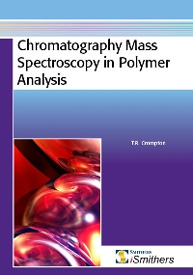iSmithers Rapra Publishing has announced the release of Chromatography Mass Spectroscopy in Polymer Analysis.
The combination of chromatography with mass spectroscopy is a very useful technique which is being increasingly used by polymer chemists to improve existing polymers and to discover new ones with specific physical properties such as thermal stability and retention of properties over a long service life.

This technique is extremely powerful for the analysis and characterisation of polymers and is often based on the use of controlled chromatography - mass spectroscopy to measure a polymer's decomposition with techniques such as pyrolysis, followed by chromatography to separate any breakdown product, and, finally, mass spectroscopy, to achieve an unequivocal identification of the pyrolysis products obtained. The detail that can be obtained by such methods includes structure of the polymer backbone, branching, end groups, isomeric detail and fine detail in the structure of copolymers.
The first three chapters of the book discuss the various chromatographic and mass spectroscopic techniques now available.
Chapters 3-8 cover the complementary methods, based on the combination of mass spectroscopy with various chromatographic techniques such as high-performance liquid chromatography, gas chromatography and supercritical fluid chromatography.
Pyrolysis chromatography-mass spectroscopy is a method of studying the structure of polymers which involves subjecting the polymer pyrolysis products to a chromatographic technique to simplify subsequent analysis and, finally mass spectroscopy to identify the pyrolysis products with the possibility of deducing finer details of polymer structure than were previously attainable by classical methods (Chapters 9-11).
By providing a thorough up-to-date review of work in this field it is hoped that the book will be of interest to all those engaged in polymer research and development, and polymer users in general.